|
There aren't too many sacred cows here at Outsider, but Arthur Conan Doyle's celebrated consulting detective is definitely one of them. We're serious fans of the original stories, and unanimously regard Jeremy Brett's interpretation of Holmes as the definitive one, despite some strong competition over the years. What we're not remotely keen on is films that trade on the Holmes brand name but all but discard what continues to make the stories and characters so compelling all these years after they were written. Yes, Mr. Ritchie, I'm looking at you. Similarly, films that seek to kick the great detective off his pedestal but offer up nothing even remotely as smart or as witty in place of the man they seek to mock tend not to impress. So is it possible to poke a fun at Mr. Holmes and his legendary status whilst simultaneously remaining respectful to him and the writings of Arthur Conan Doyle? Ladies and gentlemen, I give you Billy Wilder's magnificent The Private Life of Sherlock Holmes.
The tone is set by an elegant title sequence and a delicious opening scene, which not only deconstructs Holmes as he is presented to us by Watson in his writings, but slyly demonstrates how well-versed Wilder and his regular co-screenwriter I.A.L. Diamond are in Conan Doyle's original stories. It begins with Holmes and Watson arriving back at 221B Baker Street after the successful conclusion of another case. The hearts of Holmes purists might initially sink a little at the sight of Holmes dressed in his trademark cape and deer stalker hat, clothing with which he has become forever associated but which we all know he only wore in two of the original stories – even then, the deer stalker hat was never specified as such but drawn that way by the great Sidney Paget to accompany the stories when published in The Strand Magazine. But Wilder and Diamond are fully aware of this fact and even provide a reason why this image of Holmes has become so imprinted on the public consciousness. In the course of criticising how Watson portrays him and his cases in print, Holmes says, "You've saddled me with an improbable costume which the public now expect me to wear," to which Watson tellingly and defiantly responds, "That is not my doing. Blame the illustrator!" Oh yes, Wilder and Diamond know their Sherlock Holmes.
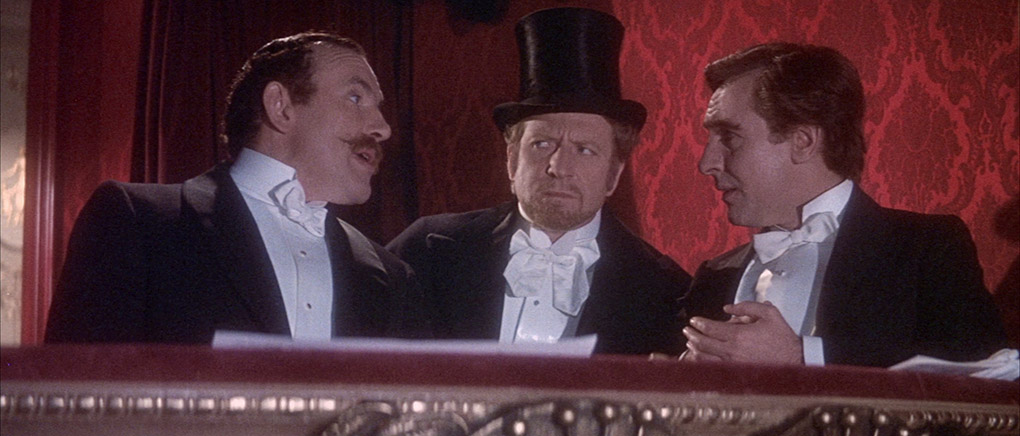
Where the two men do play some interesting games with the legend is in their questioning of Holmes's sexual orientation. Lured to the ballet with a pair of anonymously sent tickets, Holmes discovers that he has been selected to father a child with prima Russian ballerina, Madame Petrova, one that, it is reasoned, will have her questionable beauty and his brains. It's a predicament that he politely escapes from by aligning himself with Pyotr Tchaikovsky, an earlier candidate who was ultimately rejected because "women not his glass of tea." When word of this spreads rapidly through the company and the ballerinas with whom the energetically womanising Watson has been dancing are replaced with their male equivalent, Watson is furious and directly confronts Holmes about his past experience with women, an enquiry Holmes curtly dismisses as impertinent. If Watson's horror at the prospect of being thought of as gay feels a little outmoded, it's worth remembering just when the film was made and (particularly) set, and the fact that this was the one aspect of the film that really rankled Holmes devotees in its day.
It's following this that the mystery that will preoccupy Holmes for the remainder of the film kicks off with the late evening delivery of an amnesiac woman, who has been fished out of the Thames by a passing cabby and directed to their door by a card found in her hand. They take her in, and during the night Holmes discovers a clue that allows him to recover her luggage and identify her as Belgian national Gabrielle Valladon. When Gabrielle recovers her memory the following morning, she reveals that she has come to England in search of her missing engineer husband. Holmes takes up the case, and by following a series of initially baffling and seemingly disconnected clues, deduces that they need to continue their search in Scotland.
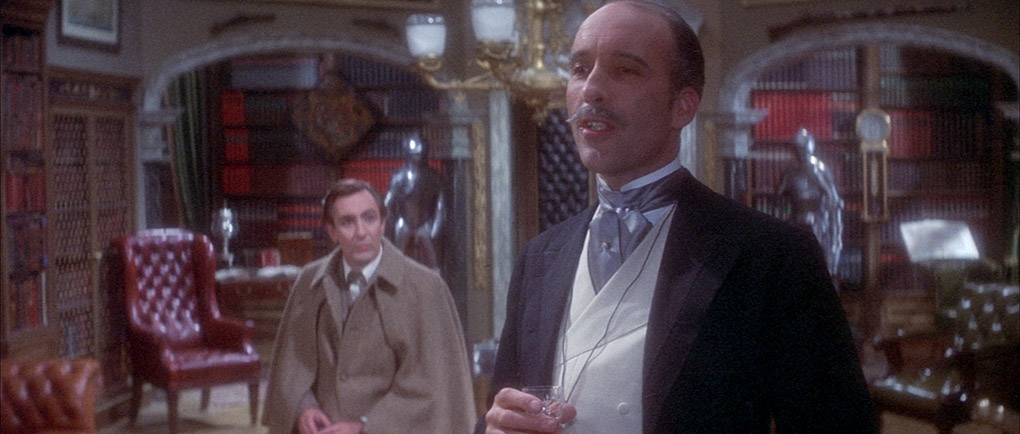
Before they head north, they are summoned to London's exclusive Diogenes Club by Holmes' elder brother Mycroft, an infrequently featured character in Conan Doyle's stories whose powers of deduction are reputed to exceed even those of his famous brother, but whose lack of ambition and dislike of physical effort prevents him from putting them to similarly creative use. He was perhaps most perfectly realised on screen in the Jeremy Brett TV series, when he was played by an appropriately portly Charles Gray, but here he is played with considerable authority by Christopher Lee, who while clearly far more agile than the man first described by Conan Doyle in The Adventure of the Greek Interpreter, has the commanding self-assurance required to cast his brother as an amateur messing with things he just doesn't fully understand. Mycroft warns Holmes off without an explanation, to which Holmes responds with a plan to fool his brother and secretly transport himself, Watson and Gabrielle to Scotland. Given the extraordinary nature of Mycroft's original summons (a letter left in where almost no-one could have known Holmes would be and that even predicted the minute at which it would be read), the idea that such a ruse would fool Mycroft for a second seems just a little unlikely.
The casting is divine across the board. Holmes and Watson are played respectively by long-established stage and screen actors Robert Stephens and Colin Blakely, and they make for a fascinatingly contrary double-act. Stephens plays Holmes as a world-weary cynic who is mildly amused by almost everything he sees or hears, while Blakely's Watson is a ball of exited energy given to explosions of outrage at the drop of a hat. The depth of his friendship with Holmes is captured in the smallest of moments, memorably when his fury at Holmes's suggestion that the two are in a homosexual relationship prompts him to hurl an object at what he mistakenly believes is his friend, yet when he thinks that he has caused physical harm as a result, his anger instantly dissolves into genuine concern. It's this bond that also prompts Watson to vocally and repeatedly express his disapproval of Holmes's cocaine habit, one he further attempts to combat by diluting the famed seven per cent solution, a deception that the canny Holmes is fully aware of.
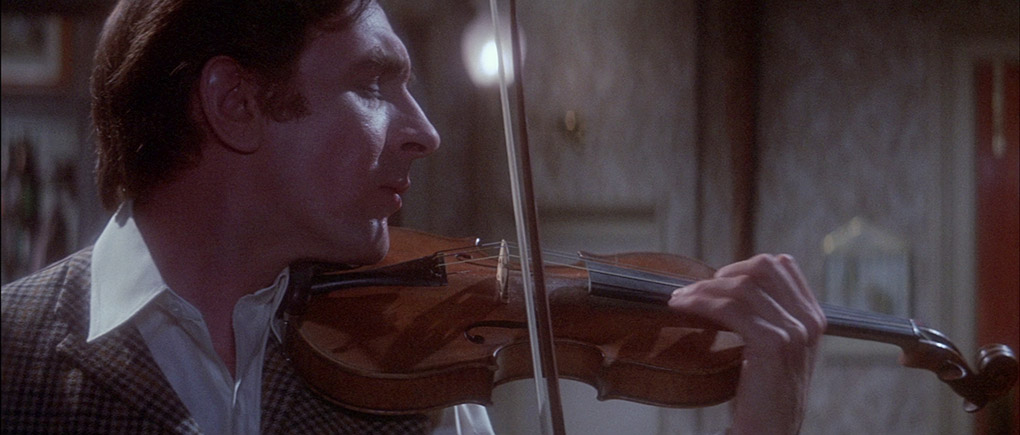
Yet for all his sardonic quips and gentle mockery, there's a melancholic edge to Stephens' interpretation, one that presents us with a Holmes whose famed distrust of women has been prompted in part by a romantic tragedy in his past. And while celebrating Holmes's deductive abilities with puzzles that only a man of his singular skill could solve, the film is also not afraid to show that he is as capable of failure as any of us mere mortals, and that he can become so absorbed by a mystery that he can fail to pick up on a single crucial aspect that has the potential to be his own undoing. This, of course, harks back, to the first Holmes short story, A Scandal in Bohemia, to which the principal story of The Private Life of Sherlock Holmes owes a considerable debt, and delivers an ending that is as moving as any you'll find in Wilder's oeuvre. I shall say no more.
Although substantially cut down from its original 200-minute running time before its release (more on this below), The Private Life of Sherlock Holmes remains to this day my very favourite made-for-cinema Holmes feature. It's a gloriously and consistently witty, wonderfully performed and handsomely mounted salute to the world's most celebrated consulting detective, one whose plotting is worthy of Conan Doyle (throwaway moments in the opening scene prove later to have considerable relevance) and whose ambition is matched at every step by its execution.
Having become used to watching this film on a 13-year-old DVD, I was looking forward to this HD upgrade from Eureka with considerable enthusiasm. The results tend to justify that anticipation, particularly the substantial increase in picture detail, which really brings Alexander Trauner's handsome production design and Christopher Challis's gorgeous scope photography to life. It's not quite as pristine as hoped, however – there are still a fair few dust spots to contend with in places (elsewhere, particularly in the later stages, the image is much cleaner), and some of the reel-change markers are still very visibly present, suggesting that a print or inter-positive was used for the remaster rather than the original negative. The contrast is well balanced and black levels are solid without pulling in surrounding detail, and the low-key colour palette is attractively rendered. There is a slightly diffused look to some of the shots, and it's hard to be sure if this was intended or endemic to the material used to source the shots in question.
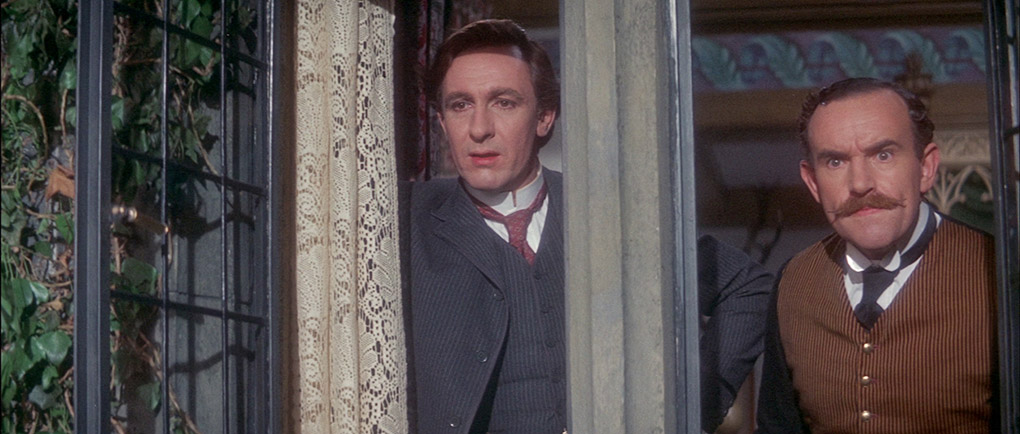
The Linear PCM 2.0 mono soundtrack is in fine shape, nicely showcasing Miklós Rózsa's lovely score and delivering the dialogue clearly. No obvious wear or damage was detectable.
Optional English subtitles for the deaf and the hearing impaired have been included.
Interview with Neil Sinyard (20:45)
Author and film scholar Neil Sinyard delivers a typically thoughtful appreciation of a film he regards as a masterpiece even in its cut-down form. You'll get no argument from me on that score. He talks about why the film was a critical and commercial flop on its release, the casting of the leads, elements that mark it as a Billy Wilder film, and suggests that it explores aspects of Holmes that Watson hasn't observed, and plenty more.
The Missing Cases (Deleted Scenes) (50:03)
As devotees of The Private Life of Sherlock Holmes are doubtless aware, the original rough cut of the film ran for 200 minutes and consisted of four stories, two of which were cut from the film for its theatrical release, along with a flashback to Holmes's university days and a prologue involving Watson's grandson. This particular special feature tidies up a couple of extras from the DVD into a single presentation of the missing material, and while the scenes in their complete form appear to have been lost, some material remains, and where all has been lost, the cut sequences are outlined through the use of screenplay scans and production stills. Personally, I think a PDF of the original script would have been preferable to the standard definition scans of the script included here, but the feature comes into its own when we get to the footage that has survived, although this is also in standard definition. The two missing cases are presented in their entirety, but in a slightly frustrating twist, only the audio survives from The Curious Case of the Upside Down Room, and only the picture from The Dreadful Business of the Naked Honeymooners. The former is illustrated with production stills and extracts from the screenplay, while the missing dialogue on the latter is delivered in the form of burned-in subtitles. Both stories are rather fun, and while Watson's misplaced deductions in The Naked Honeymooners (during a sea voyage home, Holmes offers him the chance to work out how two people found dead in their cabin met their fate, and Watson gets the wrong cabin) are laboured, it's visually distinctive and rather fun, and there's plenty to be amused by in the audio alone on The Upside Down Room. A tad surprisingly, the naked breasts of the woman under investigation in The Naked Honeymooners have been blurred out.
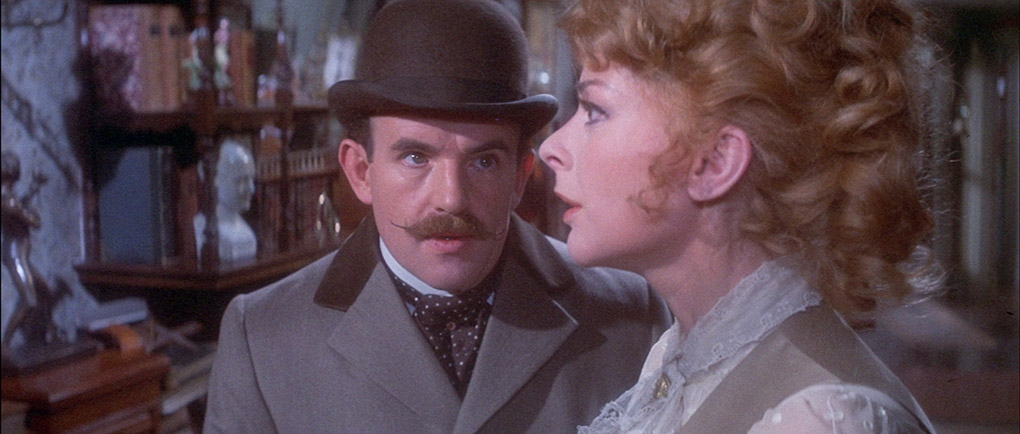
Christopher Lee Interview: Mr. Holmes, Mr. Wilder (15:17)
Another extra carried over from the earlier DVD, this interview with Lee kicks off with him describing Billy Wilder as the greatest director he has ever worked with and the role of Mycroft as one that changed his career as an actor. He deconstructs Holmes as a character, reveals that he knew Conan Doyle's son Adrian, and reminds us that he was, at the time of filming, the only actor to have played both Sherlock and Mycroft Holmes on screen. He also salutes the Basil Rathbone version of The Hound of the Baskervilles for daring to allude to Holmes's cocaine habit as early as 1939.
Deleted Epilogue (Audio Only) (6:20)
The film's original ending, in which Inspector Lestrade pops by to see if Holmes would be interested in helping with a certain series of murders in Whitechapel, a pairing of fiction with fact that was the basis for Bob Clark's fine Murder by Decree nine years later. It's worth noting that the restored material occupies little more than the final minute of this extra.
Interview with editor Ernest Walter (28:40)
Another carry-over from the previous DVD, this interview with the film's editor Ernest Walter may not be visually attractive and has audio recorded on what sounds like the on-camera mic but is still of considerable interest. Walter recalls how he became an editor after starting out as an army cameraman in the second world war, provides considerable detail on the film's original form and content, and modestly suggests that Wilder shot the film in a way that made his job so easy that he was able to spend time watching the shoot instead of editing.
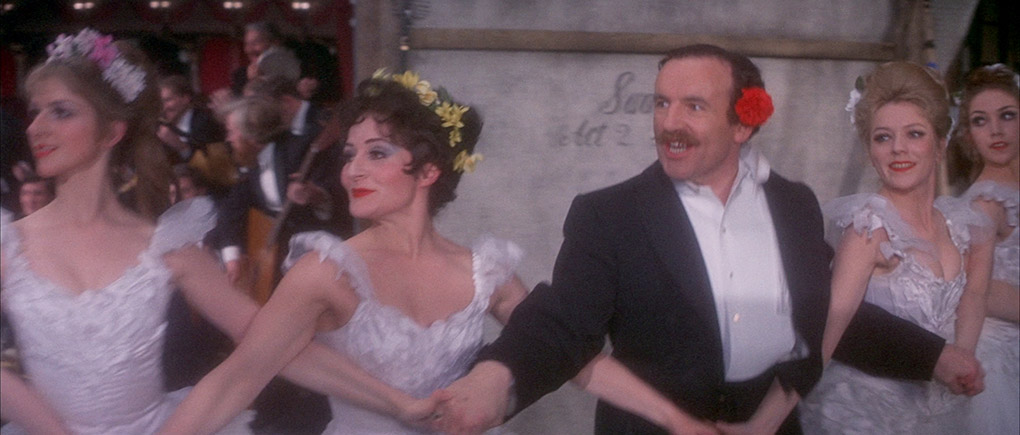
Original Theatrical Trailer (3:00)
A briskly paced trailer that has a couple of major spoilers, including the spoken specifics of an albeit telegraphed late film twist. Save this for after the movie.
Also included is a Booklet featuring a new essay by Philip Kemp, the words of Billy Wilder, and rare archival imagery, but this was not made available for review.
It now seems preposterous that a film as wonderfully written, performed and directed could have been a box office and critical failure on its release. I've loved it since I first caught at the National Film Theatre in London many years ago as part of a season of Billy Wilder films, and it never fails to get me bouncing up and down in my seat with delight. Everything about it works divinely for me, and while I'm still secretly hoping that the full version will one day be discovered and meticulously restored, this Blu-ray release from Eureka will do well enough in the meantime. It would have been nice to see the dust spots cleaned up and the reel change markers removed, but the increase in image detail over the previous DVD is still substantial, and the special features are first rate, so this comes warmly recommended.
|